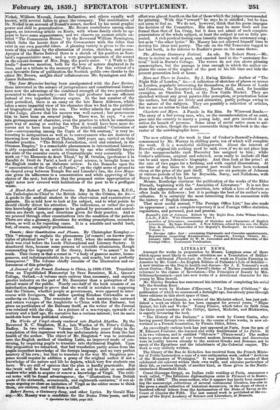LITERARY NEWS.
Amongst the works in preparation by Messrs. Longman some of those which appear most likely to excite attention are a Translation of Brillat- Savarin's celebrated Physiologie du Gout—A work on Prairie Farming in America by Mr. Caird—An English Edition of Palleskie's Life of Schiller— A new treatise on the Dog in health and disease—Sir J. E. Tennent's work about Ceylon—The Rev. Baden Powell's Order of Nature considered with reference to the claims of Revelation—The Principles of Beauty by Mrs. Schimmel enninck—and two new works of a devotional character for the young by Miss Sewell.
Mr. Shirley Brookes has announced his intention of completing his serial tale the Gordian Knot.
The new work by Madame d'Harcourt, "La Duchess° d'Orleans," the publication of which we announced a fortnight ago, has already gone through three editions in this short space of time.
M. Charles Louis Chassin, a writer of the Michelet school, has just pub- lished a work on which he has been engaged for several years, " .Egar Quinet, his Life and Works." Young France, which takes its faith from the three great teachers of the College, Quinet, Michelet, and Mickiewicz, is eagerly devouring the book.
"The History of the Italians," a little work by Cesare Cantu, after having passed through two editions in the course of two weeks, is now ad- vertised iii a French translation, by Ffrmin Didot, frares.
An exceedingly curious book has just appeared at Paris, from the pen of
M. Edouard Fournier, the learned and witty feuilletonist of La Patric. It is in two volumes, and is entitled "Old-new" (Vieux-neuf.) The author tries to prove that most of our boasted modern inventions and discoveries were in reality known already to the ancient Greeks and Romans, not to speak of the Egyptians and the inhabitants of ,the Celestial empire. The work is very cleverly written.
The library of the Rue de Richelieu has received from the French Minis- ter of Public Instruction a copy of a rare antiquarian work, called "Archives of the Monastery of Wettingen." It was printed by the monks of that celebrated old convent within their own walls, and contains particulars of their life, as curious though of another kind, as those given in the North- umberland Household Book.
Count Giuseppe Greppi, an Italian exile residing at Paris, announces a
work called, "Des Relations diplomatiques entre le Piemont et la Bulimic, de 1796 a 1803." The same author, who it appears has lately been ransack- ing the manuscript collections of several continental libraries, has also in the press a small collection of historical documents, in the shape of about a hundred official letters from the Ambassadors of the Duke of Savoy at the Court of Charles the Fifth. The last named work is published at the ex- pense of the Royal Academy of Science and Literature, at Brussels.


































 Previous page
Previous page